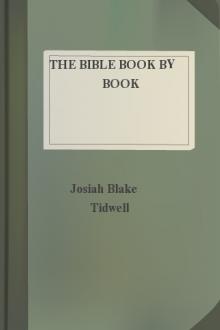The Great Doctrines of the Bible by Rev. William Evans (best books to read for self improvement TXT) 📖

- Author: Rev. William Evans
- Performer: -
Book online «The Great Doctrines of the Bible by Rev. William Evans (best books to read for self improvement TXT) 📖». Author Rev. William Evans
2. HE HAS GONE TO PREPARE A PLACE FOR HIS PEOPLE.
Heb. 9:21-24; John 14:2. He is there making all necessary preparations for the coming of His bride, the Church. In some way it seems that the heavenly sanctuary had been defiled by sin. It was necessary, therefore, that Christ purge it with His blood. What a home that will be if He prepares it!
3. HE IS NOW APPEARING BEFORE GOD IN OUR BEHALF.
Heb. 9:24—“To appear in the presence of God for us.” He is there to act as High Priest in our behalf; to present the blood of atonement. “Before the throne my Surety stands.” And yet not so much before the throne as on the throne. He is the Kingly Priest. With authority He asks, and His petitions are granted.
4. HE HAS TAKEN HIS PLACE AT THE FATHER’S RIGHT HAND THAT HE MAY FILL ALL THINGS, AWAITING THE DAY WHEN HE SHALL HAVE UNIVERSAL DOMINION.
Eph. 4:10. He fills all things with His presence, with His work, with Himself. He is not a local Christ any longer (cf. Jer. 23:24).
Heb. 10:12, 13; Acts 3:20, 21—“He shall send Jesus Christ … . whom the heaven must receive until the times of restitution of all things.” Having won His victory, Christ is now waiting for all the spoils to be gathered. He is expecting, not doubting, but assuredly waiting; already His feet are upon the neck of the enemy. The Apocalypse pictures Christ entering upon the actual possession of His kingdom.
VI. THE RESULTS OF THE ASCENSION AND EXALTATION OF JESUS CHRIST.
1. IT ASSURES US OF A FREE AND CONFIDENT ACCESS INTO THE PRESENCE OF GOD.
Heb. 4:14-16 (R. V.)—“Having then a great high priest, who hath passed through the heavens, Jesus the Son of God, let us hold fast our confession… . . Let us therefore draw near with boldness unto the throne of grace.” Our great High Priest is before the throne to present petitions, secure pardons for His people, and to communicate blessings in answer to their faith and prayers. We may have a free and fearless confidence in our approach to God.
2. AN ASSURED HOPE OF IMMORTALITY.
2 Cor. 5:1-8 describes the longing of the Christian to be clothed with a body after he has been called upon to lay aside this earthly tabernacle. He has no desire for a bodiless existence. The ascension and exaltation of Christ assures the believer that as Christ, so he also will take his place in heaven with a body like unto Christ’s own glorious body.
3. IT GIVES THE BELIEVER CONFIDENCE IN GOD’S PROVIDENCE TO BELIEVE THAT ALL THINGS ARE WORKING TOGETHER FOR HIS GOOD
Seeing that Christ, the believer’s Head, is exalted far above all things in heaven and earth, it is possible for the believer to be master of circumstances, and superior to all his environment (Eph. 1:22; cf. Col. 1:15-18).
4. CHRIST HAS BEEN MADE HEAD OVER ALL THINGS FOR THE CHURCH.
That is to say, that everything is subject to Christ, and that for the Church’s sake. Eph. 1:22 (R. V.)—“And he put all things in subjection under his feet, and gave him to be head over all things to the church.” Christ is the fullness of the Father for the Church (Col. 1:19; 2:9, 10). Christ bestows the Holy Spirit upon the Church (Acts 2:33-36; John 7:37-39). He receives for, and bestows upon the Church spiritual gifts (Eph. 4:8-12).
THE DOCTRINE OF THE HOLY SPIRIT
I. THE PERSONALITY OF THE HOLY SPIRIT.
1. PERSONAL NAMES GIVEN TO THE SPIRIT. 2. PERSONAL PRONOUNS USED OF THE SPIRIT. 3. THE SPIRIT ASSOCIATED WITH THE FATHER AND THE SON. 4. THE SPIRIT POSSESSES PERSONAL CHARACTERISTICS. 5. PERSONAL ACTS ARE ASCRIBED TO THE HOLY SPIRIT. 6. THE SPIRIT IS SUBJECT TO PERSONAL TREATMENT.
II. THE DEITY OF THE HOLY SPIRIT.
1. DIVINE NAMES ARE GIVEN TO THE SPIRIT. 2. DIVINE ATTRIBUTES. 3. DIVINE WORKS. 4. NAME OF THE SPIRIT ASSOCIATED WITH NAMES OF THE DEITY. 5. COMPARISON OF OLD TESTAMENT PASSAGES WITH SOME IN THE NEW TESTAMENT.
III. THE NAMES OF THE HOLY SPIRIT.
1. THE HOLY SPIRIT. 2. THE SPIRIT OF GRACE. 3. THE SPIRIT OF BURNING. 4. THE SPIRIT OF TRUTH. 5. THE SPIRIT OF LIFE. 6. THE SPIRIT OF WISDOM AND KNOWLEDGE. 7. THE SPIRIT OF PROMISE. 8. THE SPIRIT OF GLORY. 9. THE SPIRIT OF GOD AND OF CHRIST. IV. THE WORK OF THE HOLY SPIRIT.
1. IN RELATION TO THE WORLD. a) The Universe. b) The World of Mankind. 2. IN RELATION TO THE BELIEVER. 3. IN RELATION TO THE SCRIPTURES. 4. IN RELATION TO JESUS CHRIST.
V. OFFENCES AGAINST THE HOLY SPIRIT.
1. BY THE SINNER. a) Resisting. b) Insulting. c) Blaspheming. 2. BY THE BELIEVER. a) Grieving. b) Lying to. c) Quenching.
THE DOCTRINE OF THE HOLY SPIRIT.
We are living in the Age of the Spirit. The Old Testament period may be called the Age of the Father; the period covered by the Gospels, the Age of the Son; from Pentecost until the second advent of Christ, the Age of the Spirit.
All matters pertaining to the doctrine of the Holy Spirit should, therefore, be of special interest to us who live in this age of special privilege. Yet how ignorant is the average Christian concerning matters pertaining to the Spirit. The Christian church today needs to heed Paul’s exhortation: “Now concerning spiritual gifts (or, perhaps better, “matters pertaining to the Spirit”), I would not have you ignorant.” May it not be that the reason why the sin against the Holy Spirit is so grievous is because it is a sin committed in the light and with the knowledge of the clearest and fullest revelation of the Godhead. We cannot, therefore, afford to remain in ignorance of this all-important doctrine.
I. THE PERSONALITY OF THE HOLY SPIRIT.
It seems strange that it should be necessary to discuss this phase of the subject at all. Indeed, in the light of the last discourse of the Master (John 14-16), it seems superfluous, if not really insulting. During all the ages of the Christian era, however, it has been necessary to emphasize this phase of the doctrine of the Spirit (cf. Arianism, Socinianism, Unitarianism).
1. WHY IS THE PERSONALITY OF THE HOLY SPIRIT QUESTIONED?
a) Because, as Contrasted with the Other Persons of the Godhead, the Spirit Seems Impersonal.
The visible creation makes the personality of God the Father somewhat easy to conceive; the incarnation makes it almost, if not altogether, impossible to disbelieve in the personality of Jesus Christ; but the acts and workings of the Holy Spirit are so secret and mystical, so much is said of His influence, graces, power and gifts, that we are prone to think of Him as an influence, a power, a manifestation or influence of the Divine nature, an agent rather than a Person.
b) Because of the Names Given to the Holy Spirit.
He is called breath, wind, power. The symbols used in speaking of the Spirit are oil, fire, water, etc. See John 3:5-8; Acts 2:1-4; John 20:22; 1 John 2:20. It is not strange that in view of all this some students of the Scriptures may have been led to believe, erroneously of course, that the Holy Spirit is an impersonal influence emanating from God the Father.
c) Because the Holy Spirit is not usually Associated with the Father and the Son in the Greetings and Salutation of the New Testament.
For illustration, see 1 Thess. 3:11—“Now God himself and our Father, and our Lord Jesus Christ, direct our way unto you.” Yet we must remember, in this connection, that the Apostolic Benediction in 2 Cor. 13:14 does associate the three persons of the Trinity, thereby asserting their personality equally.
d) Because the Word or Name “Spirit” is Neuter.
It is true that the same Greek word is translated wind and Spirit; also that the Authorized Version uses the neuter pronoun “itself,” when speaking of the Holy Spirit (Rom. 8:16, 26). As we shall see later, the Revised Version substitutes “himself” for “itself.”
The importance of the personality of the Spirit, and of our being assured of this fact is forcibly set forth by Dr. R. A. Torrey: “If the Holy Spirit is a Divine Person and we know it not, we are robbing a Divine Being of the love and adoration which are His due. It is of the highest practical importance whether the Holy Spirit is a power that we, in our ignorance and weakness, are somehow to get hold of and use, or whether the Holy Spirit is a personal Being … . who is to get hold of us and use us. It is of the highest experimental importance… . . Many can testify to the blessing that came into their lives when they came to know the Holy Spirit, not merely as a gracious influence … . but as an ever-present, loving friend and helper.”
2. METHOD OF PROOF.
It is difficult to define personality when used of the Divine Being. God cannot be measured by human standards. God was not made in the image of man, but man in the image of God. God is not a deified man; man is rather a limited God (“a little …. less than God.” Heb. 2:7, R. V.). Only God has a perfect personality. When, however, one possesses the attributes, properties and qualities of personality, then personality may be unquestionably predicated of such a being. Does the Holy Spirit possess such properties? Let us see.
a) Names that Imply Personality are Given to the Spirit.
The Comforter: John 14:16; 16:7. “Comforter” means one who is called to your side—as a client calls a lawyer. That this name cannot be used of any abstract, impersonal influence is clear from the fact that in 1 John 2:1 the same word is used of Christ. (See Rom. 8:26). Again in John 14:16 the Holy Spirit, as the Paraclete, is to take the place of a person—Christ Himself, and to personally guide the disciples just as Jesus had been doing. No one but a person can take the place of a person; certainly no mere influence could take the place of Jesus Christ, the greatest personality that ever lived. Again, Christ, in speaking of the Spirit as the Comforter, uses the masculine definite article, and thus, by His choice of gender, teaches the personality of the Holy Spirit. There can be no parity between a person and an influence.
b) Personal Pronouns are Used of the Holy Spirit.
John 16:7, 8, 13-15: Twelve times in these verses the Greek masculine pronoun ekeinos (that one, He) is used of the Spirit. This same word is used of Christ in 1 John 2:6; 3:3, 5, 7, 16. This is especially remarkable because the Greek word for spirit (_pneuma_) is neuter, and so should have a neuter pronoun; yet, contrary to ordinary usage, a masculine pronoun is here used. This is not a pictorial personification, but a plain, definite, clear-cut statement asserting the personality of the Holy Spirit. Note also that where, in the Authorized Version, the neuter pronoun is used, the same is corrected in the Revised Version: not “itself,” but “Himself” (Rom. 8:16,26).
c) The Holy Spirit is Identified with the Father and the Son—and, indeed, with Christians—in Such a Way as to Indicate Personality.
The Baptismal Formula. Matt. 28:19. Suppose we should read, “Baptizing them in the name of the Father, and of the Son, and of the wind or breath.” Would that sound





Comments (0)